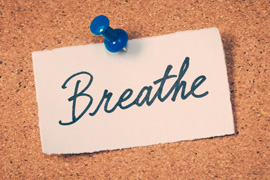November 16th, 2016
Before You Do Anything Else, Take a Deep Breath
Elizabeth Donahue, RN, MSN, NP-C
Exactly one week ago I arrived at my office in a stupor that it seemed even my favorite coffee shop could not fix. I had not slept more than two hours the night before, and on top of being tired, I was emotional. I had spent too much time in the wee hours of the morning reading post-mortems of the campaigns, a myriad of predictions and possible next steps, and receiving messages from friends who felt that they suddenly had something to lose or to fear. I felt a bit like something major had happened and yet here we all were reporting for our daily work like nothing had or would change. I literally thought to myself — how will I get through this day?
When you spend your days helping others address their physical and mental health concerns, it provides you with the kind of perspective that few are lucky enough to have day to day. It affords you the privilege of knowing the very personal stories of hundreds of people who trust and confide in you. It regularly serves as a reminder of the tenacity of the human spirit, obstacles that can be overcome, and struggles that are endured. Not every story has a happy ending of course, but they all provide perspective and I consider that a gift.
Let me pause here and say that I love my country and I respect our democracy. I also know that some people experienced the results differently than those in my inner circle and I have taken care and consideration to understand their feelings. Furthermore, I have gained some perspective in the last week. While the dust is settling, factual new information has come through, politicians are seeming to come together to move forward, and the stock market is rebounding from a dramatic plunge — and these things have somewhat lessened what seemed like a great loss. But last week, loss is exactly what I felt and I wasn’t sure how I was going to deal with that. Then my patients started arriving, and they felt it too, and it became instantly clear that my new role was to worry less about myself and figure out how to take care of them.
My first patient had a fairly benign concern, but she was also recently diagnosed with MS. She now has a pre-existing condition and is worried about what that means for her future ability to receive affordable health care. My next patient presented for a routine physical. When my medical assistant asked her if she had any specific concerns or questions about the day, she became emotional and said she wanted to talk about her anxiety related to the election. She is a recent graduate, has a new government job, and is now worried about keeping that job and how she will be treated in a male-dominant office. In another routine physical after that, a young woman requested to have an IUD placed because she feels uncertain about her ability to obtain and afford reliable birth control going forward. The woman after her earnestly asked me if she would lose her health care coverage because she is under 26 and currently on her parent’s healthcare plan thanks to the ACA, which has been targeted for repeal. My morning went on and on like this — concern after concern about very real ways in which patients have already been and may continue to be affected by an unprecedented campaign and transition. During lunchtime, a woman who cleans our office, and with whom I’ve become friendly, talked about how she is worried about her friends and family members (from her native Honduras) facing discrimination and hatred.
To all these people, I wanted to shout, I’M WORRIED TOO. But I had to realistically consider my next steps; what can I tell them? Moreover; what can I tell them when I don’t have any of the answers to their questions? Their concerns related to their health care are real and deserve a response. In medicine, we are used to doing the opposite — diagnosing an issue, making a plan, communicating next steps to a patient. We don’t have all the answers all the time, of course, but we usually at least have a strong differential diagnosis and a plan to figure things out.
So during a time when I have also been disappointed, anxious, uncertain, angry, and full of questions (you name it, I’ve felt it in the last week), I’ve developed sort of a new mantra: Take a deep breath. I might say this any number of times during a regular day in clinical care (when a cough needs to be evaluated, before an injection, when stitches are coming out, etc). But now I’m saying it with a different meaning. So, much like when something seems wrong but the diagnosis is not clear, I’m saying to my patients, “I hear your worry. Your concerns are real. We don’t have the answers right now. So don’t forget to breathe — take a deep breath — it may take time, but we will figure it out.”
I think everyone needs to do this in the wake of a very divisive election. This is not advice that is exclusive to my young, female patients who feel afraid because of their age, gender, race, employment status, etc. When tensions and emotions are running high — whether in a medical emergency or in the current political climate — before we act impulsively, before we say something that might be hurtful to another, before we jump to conclusions and judge, let’s all take a collective deep breath. After that breath, the next steps may be clearer. You might decide to refer your patients for the care that they are worried they may lose (I have done this a few times in the last couple of days); you might decide to volunteer for a cause you believe in; you might decide to engage in conversation to help you better understand what you are feeling or what someone else is feeling. I think it will help us all to start to understand and heal. Only then can we move forward in a productive and thoughtful way.




Not sure if you (US) guys can have it both ways – capitalism, free markets (to purchase health care insurance) AND health care access to all. . . . The world is eager to see how the democratically elected boss works this out, but I can certainly see the concerns for some members of the community. Just hope they were voters.
(it is medically reasonable to encourage our patients to vote – right?).
Enjoyed your blog. Most Presidents, even after running campaigns that were fast and furious, realize that they must run the country as centrists. I think Mr.Trump will do the same.
We in medicine get to have “some” input if our organizations, and we ourselves, as voters let our elected representatives know what we feel is best for our patients. Now we hear they will fix the “bad” parts of the ACA, that sounds fine. Other things need to happen. Hopefully they will. We all will not stop practicing.
Let’s keep watching, staying positive………and breathing deep when we need to.
Dave Mittman, PA, DFAAPA